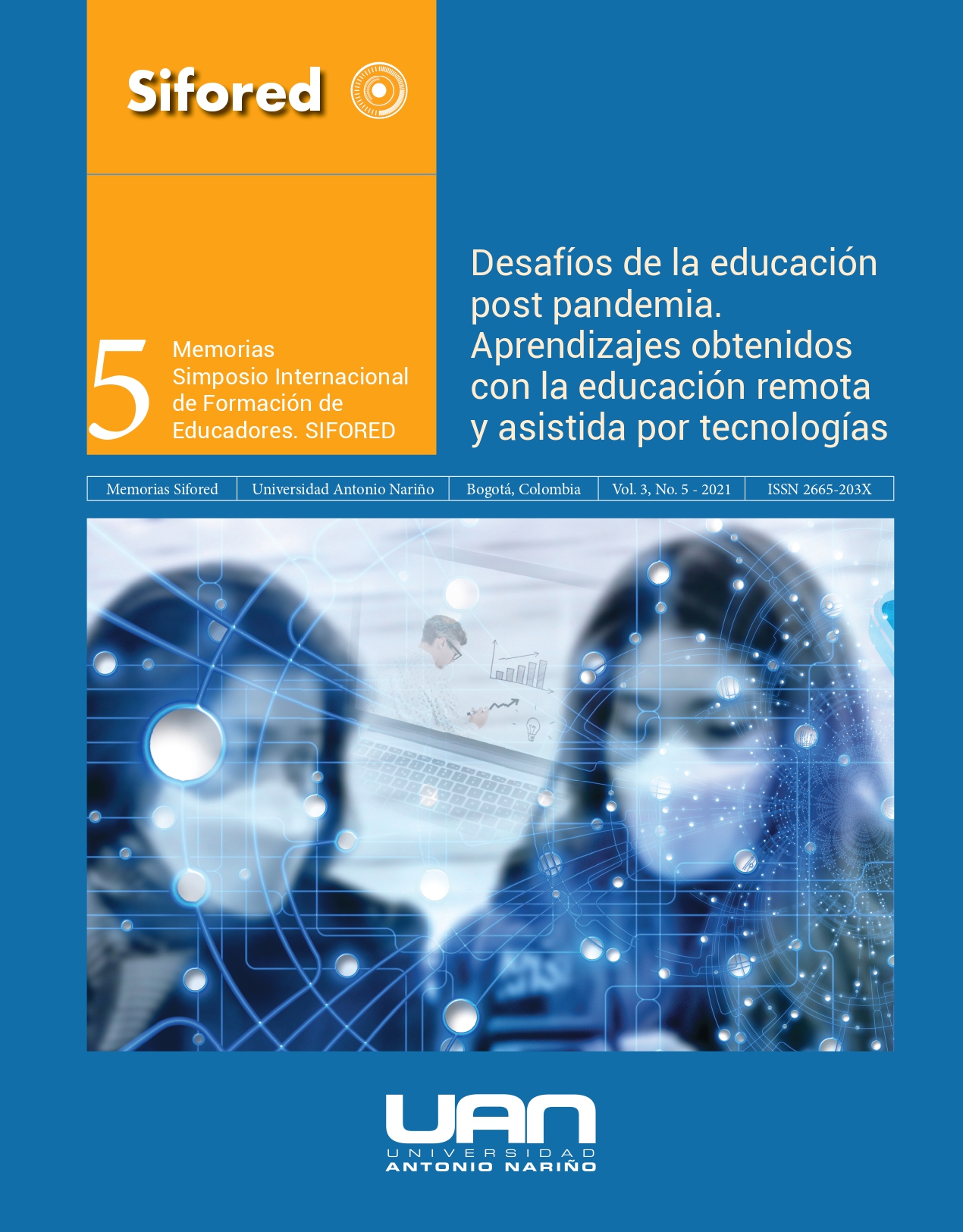Pedagogical content knowledge desde el modelo de consenso refinado: revisión sistemática de la literatura
Keywords:
database, methodologies, methodological analysis, systematic review, research approachesAbstract
This work presents a systematic review on the methodological procedures approached in the investigation of Pedagogical content knowledge (PCK) from the refined consensus model (RCM) to know the tendencies of the researchers who have adopted the RCM that arises from the second summit of the PCK held in 2016 where the need is recognized to create a unified and simplified PCK taxonomy of its components through academic discussion to guide new research. For this review, it established Google Scholar, Scopus, ERIC as databases, where twelve research articles and two doctoral dissertations were collected in the period 2019 and 2021 that used the model as a theoretical framework in the design of their research. From this sample, methodological aspects such as the studied population, areas of knowledge, levels, components and types of PCK were analyzed; research approach and instruments used for the approximation of pedagogical content knowledge. The analysis of these aspects allowed us to glimpse a scarce sample collected in articles that use the refined consensus model of the PCK leading to consider that there is a lack of knowledge due to its recent appearance for the research field in education and absence in the approach of the PCK in biology teachers and mathematics, these considerations can guide new research under this frame of reference.
Downloads
References
Azam, S. (2020). Locating Personal Pedagogical Content Knowledge of Science Teachers within Stories of Teaching Force and Motion. Eurasia Journal of Mathematics, Science and Technology Education, 16(12), 1–20. https://doi.org/10.29333/ejmste/8941
Buldu, E., & Buldu, M. (2021). Investigating Pre-Service Early Childhood Teachers’ cPCK and pPCK on the Knowledge Used in Scientific Process Through CoRe. SAGE Open, 11(2). https://doi.org/10.1177/21582440211025564
Carlson, J., Daehler, K. R., Alonzo, A. C., Barendsen, E., Berry, A., Borowski, A., ... & Wilson, C. D. (2019). The refined consensus model of pedagogical content knowledge in science education. In Repositioning pedagogical content knowledge in teachers’ knowledge for teaching science (pp. 77-94). Springer, Singapore.
Carvalho Gastaldo, B., Castro, P. M., Homem-De-Mello, P., & Leal, S. H. (2017). five years of pck summit, what has endured: 1. a descending hierarchical classification of the science pck published papers.
Coetzee, C., Rollnick, M., & Gaigher, E. (2020). Teaching Electromagnetism for the First Time: a Case Study of Pre-service Science Teachers’ Enacted Pedagogical Content Knowledge. Research in Science Education. https://doi.org/10.1007/s11165-020-09948-4
Fernandez, C. (2015). revisitando a base de conhecimentos e o conhecimento pedagógico do conteúdo (pck) de professores de ciências. Ensaio Pesquisa Em Educação Em Ciências (Belo Horizonte), 17(2), 500–528. https://doi.org/10.1590/1983-21172015170211
Kim, J. (2020). Connecting pedagogical content knowledge (pck) to teaching practice: investigating physics teachers’ enacted pck, personal pck, and engagement with student ideas in classroom discussions.
Kulgemeyer, C., Borowski, A., Buschhüter, D., Enkrott, P., Kempin, M., Reinhold, P., Riese, J., Schecker, H., Schröder, J., & Vogelsang, C. (2020). Professional knowledge affects action-related skills: The development of preservice physics teachers’ explaining skills during a field experience. Journal of Research in Science Teaching, 57(10), 1554–1582. https://doi.org/10.1002/tea.21632
Lima, S. S., Darsie, M. M. P., & Mello, G. J. (2020). Análise comparativa dos modelos usados como ferramenta metodológica nas pesquisas sobre o Conhecimento Pedagógico de Conteúdo (PCK) de professores de Física no Brasil. Caderno Brasileiro de Ensino de Física, 37(1), 79–104. https://doi.org/10.5007/2175-7941.2020v37n1p79
Magnusson, S. J., Borko, H., & Krajcik, J. S. (1999). Nature, sources, and development of pedagogical content knowledge for science teaching. In J. Gess-Newsome & N. Lederman (Eds.), Examining Pedagogical content Knowledge (pp. 95-132). Boston, MA: Kluwer Press.
Makhechane, M., & Mavhunga, E. (2021). Developing Topic-specific PCK in Chemical Equilibrium in a Chemistry PGCE Class: Feasible Or Not? African Journal of Research in Mathematics, Science and Technology Education. https://doi.org/10.1080/18117295.2021.1925486
Maryati, Prasetyo, Z. K., Wilujeng, I., & Sumintono, B. (2019). Measuring teachers’ pedagogical content knowledge using many-facet rasch model. Cakrawala Pendidikan, 38(3), 452–464. https://doi.org/10.21831/cp.v38i3.26598
Mavhunga, E. (2020). Revealing the Structural Complexity of Component Interactions of Topic-Specific PCK when Planning to Teach. Research in Science Education, 50(3), 965–986. https://doi.org/10.1007/s11165-018-9719-6
Mavhunga, E., & van der Merwe, D. (2020). Bridging Science Education’s Theory–Practice Divide: A Perspective from Teacher Education Through Topic-Specific PCK. African Journal of Research in Mathematics, Science and Technology Education, 24(1), 65–80. https://doi.org/10.1080/18117295.2020.1716496
Mazibe, E. N., Coetzee, C., & Gaigher, E. (2020). A comparison between reported and enacted pedagogical content knowledge (PCK) about graphs of motion.
Miheso, J. M. (2021). operationalizing the grand pck rubric: a case of developing a classroom rubric for portraying etspck in chemistry. https://www.researchgate.net/publication/351747697
Neumann, K., Kind, V., & Harms, U. (2019). Probing the amalgam: the relationship between science teachers’ content, pedagogical and pedagogical content knowledge. International Journal of Science Education, 41(7), 847–861. https://doi.org/10.1080/09500693.2018.1497217
Park, S., Jang, J. Y., Chen, Y. C., & Jung, J. (2010). Is Pedagogical Content Knowledge (PCK) Necessary for Reformed Science Teaching?: Evidence from an Empirical Study. Research in Science Education, 41(2), 245–260. https://doi.org/10.1007/s11165-009-9163-8
Park, S., & Oliver, J. S. (2008). Revisiting the conceptualisation of pedagogical content knowledge (PCK): PCK as a conceptual tool to understand teachers as professionals. Research in Science Education, 38(3), 261–284. https://doi.org/10.1007/s11165-007-9049-6
Sæleset, J., & Friedrichsen, P. (2021). Pre-service Science Teachers’ Pedagogical Content Knowledge Integration of Students’ Understanding in Science and Instructional Strategies. Eurasia Journal of Mathematics, Science and Technology Education, 17(5), 1–18. https://doi.org/10.29333/ejmste/10859
Rollnick, M., Bennett, J., Rhemtula, M., Dharsey, N., & Ndlovu, T. (2008). The place of subject matter knowledge in pedagogical content knowledge: A case study of South African teachers teaching the amount of substance and chemical equilibrium. International journal of science education, 30(10), 1365-1387.
Shulman, L. S. (1986). Those Who Understand: Knowledge Growth in Teaching. Educational Researcher, 15(2), 4 14. https://doi.org/10.3102/0013189X015002004
Vergara Díaz, C., & Mardones, H. C. (2014). Conocimiento Pedagógico del Contenido: ¿el paradigma perdido en la formación inicial y continua de profesores en Chile? In Estudios Pedagógicos: Vol. XL.
Downloads
Published
-
Abstract567
-
PDF (Español)659
How to Cite
Issue
Section
License

This work is licensed under a Creative Commons Attribution-NonCommercial-ShareAlike 4.0 International License.


 Portal de Ciencia Abierta
Portal de Ciencia Abierta